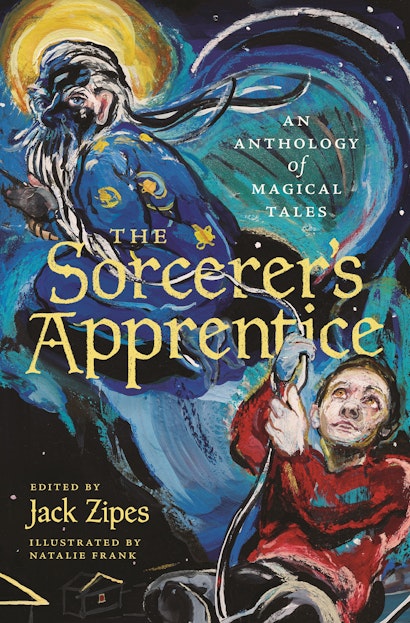“The Sorcerer’s Apprentice” might conjure up images of Mickey Mouse from the Disney film Fantasia, or of Harry Potter. As this anthology reveals, however, “sorcerer’s apprentice” tales—in which a young person rebels against, or complies with, an authority who holds the keys to magical powers—have been told through the centuries, in many languages and cultures, from classical times to today. This unique and beautifully illustrated book brings together more than fifty sorcerer’s apprentice stories by a plethora of writers, including Ovid, Sir Walter Scott, and the Brothers Grimm. From Goethe’s “The Pupil in Magic” to A. K. Ramanujan’s “The Guru and His Disciple,” this expansive collection presents variations of a classic passed down through countries and eras.
Readers enter worlds where household objects are brought to life and shape-shifting occurs from human to animal and back again. We meet two types of apprentice: “The Humiliated Apprentice,” a foolish bumbler who wields magic ineffectively and promotes obedience to authority; and “The Rebellious Apprentice” who, through ambition and transformative skills, promotes empowerment and self-awareness. In an extensive introduction, esteemed fairy-tale scholar Jack Zipes discusses the significance and meaning of the apprentice stories, the contradictions in popular retellings, and the importance of magic as a tool of resistance against figures who abuse their authority. Twenty specially commissioned black-and-white illustrations by noted artist Natalie Frank bring the stories to visual life.
The Sorcerer’s Apprentice enlightens and entertains readers with enduring, spellbinding tales of sorcery that have been with us through the ages.
Jack Zipes is the editor and translator of The Original Folk and Fairy Tales of the Brothers Grimm (Princeton) and the editor of The Great Fairy Tale Tradition (Norton). He is professor emeritus of German and comparative literature at the University of Minnesota. Natalie Frank is an American artist currently living and working in New York City. Her work is held in multiple museum collections, including the Whitney Museum of American Art and the Brooklyn Museum.
"[A]n eclectic collection . . . spanning millennia and continents."—Cameron Woodhead, Sydney Morning Herald
"[A] comprehensive anthology. . . . [A]lso of note are artist Frank's gorgeous illustrations."—Library Journal
"It is not often that a new book comes along that is both a breakthrough in scholarly terms and also a magnificent work of art. Jack Zipes's The Sorcerer’s Apprentice, illustrated by Natalie Frank, is both."—Maria Tatar, Breezes from Wonderland
"Beautiful. . . . I highly suggest it to everyone."—Anna Maria Polidori, Al Femminile
"The Sorcerer's Apprentice provides a selection of high-quality tales. It gives an overview of the types of the tales included, and the introductory article is filled with examples showing the variety of the corpus. In addition to presenting analysis rooted in psychologyand sociology, this book offers a convincing explanation for the immortality of tales featuring the sorcerer’s apprentice, wherein Zipes sees eternal conflicts of manmade societies: generational, political, social, and economical, fueled by the natural struggle of maturing boys to obtain self-identity and self-confidence."—Yelena Francis, Journal of Folklore Research
"As always, Zipes shows us how a knowledgeable master can put these mundane tools of scholarship to work to reveal the magic."—Donald Haase, Gramarye
"An intriguing hybrid that takes the innovative step of presenting the material being analysed to the book’s readership."—Carys Crossen, Folklore
"Jack Zipes has always been a kind of sorcerer himself, skilled in discovering, transforming, translating, and understanding the old tales of magic that appear in different but similar forms all over the world. This is a wonderful collection."—Alison Lurie, author of Don't Tell the Grown-Ups: The Subversive Power of Children's Literature
"In this rich and wonderful anthology, Zipes makes a powerful case for the salience and enduring timelessness of the sorcerer tales, not only historically in light of the vastness of the variants that have come down to us but also because of the social, psychological, liberationist, and subversive relevance of the tales even today. This is a story whose ‘story' needs to be told."—Donald Beecher, Carleton University
"Zipes's outstanding and important book presents a compelling look at the traditional tale ‘The Magician and His Pupil,' and the copious international, intercultural variations of this story. Readers will find trenchant insights and may be surprised to learn that a tale they thought they knew has much greater complexity than they imagined."—Pauline Greenhill, coeditor of Fairy-Tale Films Beyond Disney


